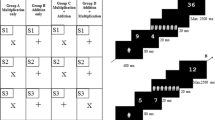Abstract
The basic question of the present experiment was whether people use a combination of arithmetic problem solving strategies to reject false products to multiplication problems or whether they simply use the single most efficient strategy. People had to verify true and false, five and non-five arithmetic problems. Compared with no-rule violation problems, people were faster with (a) five problems that violated the five rule (i.e., N×5=number with 5 or 0 as the final digit; e.g., 15 × 4=62), (b) problems that violated the parity rule (i.e., to be true, a product must be even if either or both of its multipliers is even; otherwise, it must be odd; 4 × 38=149), and (c) problems that violated both the parity and five rules (e.g., 29 × 5=142). Finally, people were equally fast and accurate when they solved two-rule violation problems than when they solved five-rule violation problems, and faster for those two types of problems than for parity-rule violation problems. Clearly, people use the single most efficient strategy when they reject false product to multiplication problems. This result has implications for our understanding of strategy selection in both arithmetic in particular and human cognition in general.
Similar content being viewed by others
Author information
Authors and Affiliations
Additional information
Received: 18 October 1999 / Accepted: 27 January 2000
Rights and permissions
About this article
Cite this article
Masse, C., Lemaire, P. Do people combine the parity- and five-rule checking strategies in product verification?. Psychological Research Psychologische Forschung 65, 28–33 (2001). https://doi.org/10.1007/s004260000030
Issue Date:
DOI: https://doi.org/10.1007/s004260000030




